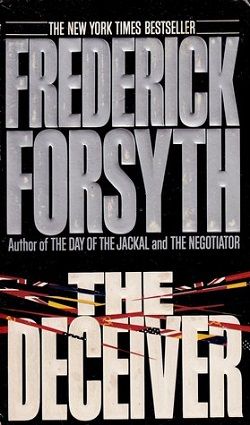Summary

The Deceiver
by Frederick Forsyth
As an intrepid and inventive field agent, McCready's independent style has often driven him beyond the rules. He has not been afraid to press the CIA to the explosion point - or to play cat-and-mouse with the KGB. He has successfully tricked Qaddafi and the IRA and once even set himself up as governor of a remote Caribbean island torn between Fidel Castor and the Colombian drug trade.
But times have changed and mavericks like McCready are an endangered species. Now, before a panel of his peers, McCready must defend his unorthodox exploits or face dismissal. What hangs in the balance is not only his own career, but the very future of British intelligence.
.
Read
The Deceiver on http://kissnovel.net
Martial Peak Reviews
Frederick Forsyth's The Deceiver is a masterclass in espionage fiction, weaving a complex narrative that explores the moral ambiguities of intelligence work through the lens of its protagonist, McCready. Forsyth, known for his meticulous research and gripping storytelling, delivers a tale that not only entertains but also provokes thought about the nature of loyalty, the cost of independence, and the shifting landscape of modern intelligence.
At the heart of the novel is McCready, a seasoned field agent whose unorthodox methods have earned him both accolades and ire within the intelligence community. Forsyth paints McCready as a quintessential maverick—brilliant, resourceful, and often reckless. His exploits, which include outsmarting figures like Qaddafi and playing dangerous games with the KGB, showcase his ingenuity but also highlight the precariousness of his position. As the narrative unfolds, McCready finds himself at a crossroads, facing a panel of peers who question his methods and threaten his career. This setup serves as a compelling framework for the story, allowing Forsyth to delve into themes of accountability and the evolution of espionage in a world that increasingly values conformity over creativity.
One of the most striking aspects of The Deceiver is its exploration of the changing nature of intelligence work. Forsyth contrasts the old-school, independent spirit embodied by McCready with the bureaucratic tendencies of contemporary agencies. This tension is palpable throughout the book, as McCready's past successes are juxtaposed against the current climate that favors protocol and risk aversion. Forsyth's commentary on this shift is particularly relevant in today's world, where the complexities of global politics often require innovative thinking that can clash with institutional norms.
Character development is another strong suit of Forsyth's writing. McCready is not merely a caricature of the rogue agent; he is a deeply flawed individual grappling with the consequences of his choices. His interactions with colleagues and superiors reveal a man who is both confident and vulnerable, a trait that makes him relatable despite his extraordinary circumstances. Forsyth skillfully crafts supporting characters who serve as foils to McCready, each representing different facets of the intelligence community. This dynamic enriches the narrative, providing readers with multiple perspectives on the ethical dilemmas faced by those in the field.
The pacing of the novel is expertly handled, with Forsyth balancing intense action sequences with quieter moments of introspection. The tension builds as McCready defends his past actions, and the stakes rise with each revelation. Forsyth's ability to maintain suspense while exploring deeper themes is a testament to his skill as a storyteller. Readers are drawn into the intricacies of espionage, feeling the weight of McCready's choices and the potential fallout from his unorthodox methods.
Moreover, Forsyth's prose is sharp and engaging, filled with vivid descriptions that bring the various settings to life. From the high-stakes world of intelligence briefings to the gritty underbelly of international intrigue, Forsyth's attention to detail immerses readers in the narrative. His ability to convey complex ideas in an accessible manner ensures that even those unfamiliar with the intricacies of espionage can appreciate the story's depth.
In terms of thematic resonance, The Deceiver raises important questions about the nature of truth and deception. McCready's very existence as a "deceiver" challenges readers to consider the moral implications of lying in the name of national security. Forsyth does not shy away from the uncomfortable realities of espionage, presenting a world where the lines between right and wrong are often blurred. This theme is reminiscent of other works in the genre, such as John le Carré's novels, which similarly grapple with the ethical complexities of intelligence work. However, Forsyth's approach is distinct in its focus on the individual agent's perspective, providing a more personal lens through which to examine these issues.
Ultimately, The Deceiver is a thought-provoking and thrilling read that showcases Frederick Forsyth's prowess as a storyteller. It is a novel that challenges readers to reflect on the nature of loyalty, the consequences of independence, and the ever-evolving landscape of intelligence. McCready's journey is not just about survival; it is a quest for understanding in a world where trust is a rare commodity. Forsyth's ability to blend action with profound themes makes this book a standout in the genre, appealing to both fans of espionage fiction and those seeking a deeper exploration of the human condition.
In conclusion, The Deceiver is a compelling narrative that resonates with contemporary issues while remaining firmly rooted in the thrilling world of espionage. Forsyth's skillful character development, intricate plotting, and thematic depth ensure that this novel will leave a lasting impact on its readers. For those who appreciate a well-crafted story that challenges the status quo, The Deceiver is a must-read.
























Reviews 0
Post a Reviews: